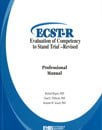
Evaluation of Competency to Stand Trial-Revised ecst-r
For: Evaluate an individual's competency to stand trial in ages 18 and older
Reading Level: Adult - Elder Adult
Format: Paper-and-Pencil
Length: Varies
Scoring: Hand Scored
Printed Kits
Click to browse products
Printed Forms & Handscoring Materials
Test forms, response booklets and scoring reference manuals.
ECST-R Introductory Kit
ECST-R Profile/Summary Forms (25)
ECST-R Record Forms (25)
Authors
Richard Rogers, PhD, ABPP, Chad E. Tillbrook, PhD, Kenneth W. Sewell, PhD
Description
The ECST-R represents major advances in the assessment of competency to stand trial. Beyond its exceptional inter-rater reliability, the ECST-R provides five important advantages over existing competency measures.
Congruence with the Dusky standard -The ECST-R was developed via prototypical analysis to correspond with the Dusky standard for competency to stand trial.
Established construct validity -The Competency scales of the ECST-R were rigorously tested via confirmatory factor analysis; its three factors are logically relevant to the Dusky standard.
Admissibility under the Daubert standard -The Supreme Court in Daubert v. Merrell Dow Pharmaceuticals, Inc. (1993) established the standards for the admissibility of expert evidence. The ECST-R is the first competency measure to formally address known error rates in light of this standard.
Systematic screening for feigned incompetency -The ECST-R examines two domains (i.e. psychotic and non psychotic domains) with two detection strategies (i.e. atypical presentation and symptom severity) to screen for feigned incompetency.
Focus on case-specific information -A key advantage of the ECST-R over other competency measures is its focus on case-specific information that is relevant to the pending case and to the individual’s relationship with his or her defense counsel.
The ECST-R is a semi-structured interview designed to assess dimensions of competency to stand trial as propounded in Dusky v. United States (1960) and consistently affirmed in subsequent Supreme Court decisions. In addition, the ECST-R provides a systematic screening for feigned incompetency to stand trial, with questions probing purported impairment and symptomatology specifically germane to competency issues.
The ECST-R is appropriate for use with individuals aged 18 years and older who are involved in adult proceedings. It was also validated on defendants with a range of cognitive abilities. Most defendants with functional intelligence in the borderline and upper level of mild mental retardation (i.e., IQs = 60-69) may be tested with the ECST-R.
The ECST-R contains 18 items and three individual scales that assess separate dimensions of competency to stand trial: Factual Understanding of the Courtroom Proceedings, Rational Understanding of the Courtroom Proceedings, and Consult with Counsel. The ECST-R also includes 28 items and five scales for Atypical Presentation: Realistic, Psychotic, Non psychotic, Impairment, and Both (Psychotic and Non psychotic combined).
Validation and professional applications of the ECST-R are carefully summarised in the Professional Manual. The test materials are conveniently organised into the ECST-R binder with the ECST-R Interview Booklet and the Record Form presented side-by-side for ease of use. A Profile/Summary Form provides a handy record of ECST-R results. This organisation provides clinicians with ready access to questions, ratings and scoring. At the same time, this format protects the security of the test questions. The ECST-R cmay be used comfortably by both right-handed and left-handed clinicians and conveniently provides its own writing surface.
NB: Prices are in Australian dollars inclusive of GST. NZ customers need to log in to view ex-GST prices.



